- Home
- Dusty Richards
Deuces Wild
Deuces Wild Read online
Praise for Dusty Richards and the debut of his new Western series
Deuces Wild
“When you pick up a Dusty Richards novel you’d first better pull your hat down snug because you’re in for a wild ride. Deuces Wild is no exception… . And while you are enjoying a mighty fine read, Dusty is very likely to teach you a few things about the American west as well… . You’re gonna love it.”
—Frank Roderus, two-time Spur Award winner
“Deuces Wild is a tale of peril on the desert, of revenge extracted, and of injustice righted. Richards writes of the bloody pursuit of the infamous Apache scout, Deuces … with the detail and authority of a man who’s walked the walk and talked the talk.”
—Sheldon Russell, Spur Award finalist and author of Requiem at Dawn
“What a great ride! … With twists, turns, and tensions along the way.”
—Cotton Smith, author of The Thirteenth Bullet
“Dusty Richards continues his long-standing tradition of pleasing his readers with Western action and historical truths. A great read.”
—Robert Vaughn, author of Clarion’s Call
DEUCES WILD
DUSTY RICHARDS
POCKET STAR BOOKS
New York London Toronto Sydney
The sale of this book without its cover is unauthorized. If you purchased this book without a cover, you should be aware that it was reported to the pubisher as “unsold and destroyed.” Neither the author nor the publisher has received payment for the sale of this “stripped book.”
This book is a work of fiction. Names, characters, places and incidents are products of the author’s imagination or are used fictitiously. Any resemblance to actual events or locales or persons, living or dead, is entirely coincidental.
An Original Publication of POCKET BOOKS
A Pocket Star Book published by
POCKET BOOKS, a division of Simon & Schuster, Inc.
1230 Avenue of the Americas, New York, NY 10020
Copyright © 2004 by Dusty Richards
All rights reserved, including the right to reproduce this book or portions thereof in any form whatsoever.
For information address Pocket Books, 1230 Avenue of the Americas, New York, NY 10020
www.SimonandSchuster.com
ISBN: 0-7434-7565-8
eISBN: 978-1-451-60444-3
First Pocket Books printing June 2004
10 9 8 7 6 5 4 3 2 1
POCKET STAR BOOKS and colophon are registered trademarks of Simon & Schuster, Inc.
Interior book design by Davina Mock
Cover art design by Patrick Kang
Cover illustration by Steven Assel
Manufactured in the United States of America
For information regarding special discounts for bulk purchases, please contact Simon & Schuster Special Sales at 1-800-456-6798 or [email protected].
I dedicate this book to my dad, John. Together, we saw the sun come up in Bloody Basin on my first deer hunt. In the Superstition Mountains, we searched for the Lost Dutchman Gold Mine. He never knew much about a horse, but he eared down my first one. And when I got bucked off and we had to catch her again in a forty-acre field, he said, “This time, ride her.” I did. Thanks, Dad. I’ll keep trying to ride them.
DEUCES WILD
Prologue
A BREATH OF HOT AIR THROUGH THE SIDE WINDOW raised the sheer curtain, the first such relief in hours to the crowded military courtroom. Captain Jason Kimble used his finger to loosen the tightly buttoned collar. A woolen uniform in the heat of the Arizona summer was not only ludicrous but harsh punishment.
“Seven Forty-five is the accused’s tribal number,” the attorney for the defense reiterated, standing at the table beside his seated client, the Apache scout Deuces, on trial for the murder of another scout by the name of Sombrero. The deceased scout’s numerical designation was Sixty-eight. Captain Kimble was familiar enough with the system used to identify the Apaches; the first number defined the tribal group, the next number was a personal ID.
Throughout the morning, the prosecutor had grilled his expert witnesses, who explained how Seven Forty-five had crushed Sixty-eight’s skull with a rock tomahawk, cut off his male organ and inserted it into Sombrero’s mouth, and also castrated the victim. No mention was made of the whereabouts of the man’s other missing parts. A ghastly enough way to mutilate anyone, even for an aborigine.
“Excuse me!” Someone burst through the double doors. The man swept off a wide-brimmed straw hat and strode up the center aisle. On his way, he casually dropped the sombrero on the floor and continued his march.
From his center seat between the other two judges, Colonel O’Malley bolted up in surprise at the intrusion.
“This is a court of military law, sir.”
“I know, sir,” the man said, and pushed the dark brown hair from his forehead. “But I need to say something very important to this court.”
The intruder’s hard gaze struck Kimble and held him.
Perhaps five feet eleven and thinly built, this man standing in the aisle appeared to be all muscle. In canvas pants, galluses, and a fresh white collarless shirt, he looked like most other civilians on the frontier.
“It’s the scout, Tom Horn,” Captain Brokaw whispered on O’Malley’s side.
“This is highly irregular,” the colonel said. “We are conducting a military court of law here. Mr. Horn, is it?”
“Yes, sir. Tom Horn, sir. I’ve ridden all day and night from Mexico to testify in this man’s behalf.”
“Why didn’t you present yourself for the preliminaries of this trial?”
“I’ve been with the U.S. Army in pursuit of the last Chiricahua hostiles in Sonora, sir.”
“Your appearance this late is very irregular. Counselors, approach the bench.”
Kimble leaned forward to hear them as they gathered before the judges’ table. He studied the intense face of the white scout. Horn was a legend. Even at Kimble’s regular post at San Carlos, he had heard much about the exploits of this man. Behind chief scout Al Sieber, Horn was the most sought-after man for scouting in the territory. For Horn to ride back from the Sierra Madres to speak at a trial should mean something.
O’Malley looked over at Kimble. “What is your opinion?”
“I would like to hear what Horn has to say. He’s a man of reputation.”
Horn nodded and looked at the other two judges.
“This buck is guilty as hell. I don’t know what any more discussion would do. What do you say, Brokaw?”
O’Malley asked.
The man looked uncomfortable; O’Malley seemed to be leaving the decision up to him. No soldier in his right mind deliberately made a colonel angry. He might have to serve under him some time. Plus, colonels had power enough to kill a future promotion. Brokaw squirmed, obviously troubled.
“What can Horn hurt?” the defense’s Lieutenant Corman asked.
“Waste more damned time,” the prosecutor, Captain Hampton, growled.
“That an objection, Captain Hampton?”
“No, sir.”
O’Malley sat back in his chair, his arms folded over his chest. “Don’t take up the whole damn afternoon, Horn. It’s hotter than seven shades of hell in here. Get on with it. You may be seated, gentlemen.”
When everyone had his place, O’Malley cleared his throat. “Let the record show that Tom Horn wished to speak to this court regarding the case before us today.
There being no objections, we are going to listen to Mr.
Horn’s words regarding the defendant in this case.
“That is why you are here, sir?” O’Malley directed his question at the scout.
“Yes, Colonel.”
“That’s in the reco
rd. Bailiff, swear him in.”
Kimble sat back, tented his fingers, and waited. The swearing in and identification complete, Horn asked O’Malley if he might stand and give his testimony.
With a sharp nod, Horn took a few steps to the right. The man’s mannerisms and movements were so catlike they intrigued Kimble. In the ways of the giant cougars, Horn’s lithe, light-footed movements spoke of smooth, rippling muscles. When the scout turned, Kimble noticed the soft, deerskin squaw boots that he wore. Some said that Horn had an Apache wife. Maybe more than one. He spoke the dialect and fluent Spanish, as well.
“You call him Seven Forty-five.” Horn indicated the stone-faced Apache seated with his defense lawyer. “We call him Deuces. So I shall call him Deuces when I speak of him.” Then Horn spoke a few guttural words in Apache to him. The defendant nodded.
“I asked Deuces, in Apache, if he understood what this trial meant. He told me yes.”
“Mr. Horn, we have a competent translator. Ramón Hernandez has been present at all times,” the colonel directed.
“Yes, sir, but I wanted to hear Deuces tell me he savvied it all.”
“You may continue, but, sir—I hope this is going to be brief.”
“Deuces was born up on the Gila headwaters. His mother was half Messikin. His father was a full-blood Warm Springs Apache. He came from Victorio’s band in New Mexico.”
Horn held up his hand to stay the colonel’s unspoken warning about brevity. “Allow me to tell about this man.”
O’Malley surrendered but still looked short on patience.
“Gentlemen, Deuces was raised in the traditional Apache way. He began to hunt as a boy. You may find it disgusting, but Apache boys use bows and arrows to hunt rats. His people ate them. You people eat rabbits but not rats. Same thing, only it’s hard to shoot a jackrabbit with a bow and arrow. So they learned success, first killing rats. More rats than there are rabbits, anyway.
“They teach their children many things. To hunt, but since they have no laws or judges like we do, they are taught to kill the lawless. Only way that you can survive in what them professors call a Stone Age society.
“Now, you say he’s a scout and has to act like we do.”
Horn shook his head in disapproval and continued to pace back and forth in front of the bench. Kimble wondered if this testimony was intended for himself and the other judges or for the audience of soldiers, civilians, and women. Earlier, the women had been temporarily excused from the courtroom when the doctor made his explanation of the mutilations to the deceased’s body and private parts. Too indecent for any lady’s tender ears.
“Let me tell you about this man called Sombrero. His record as a scout was a four-letter word. No, ladies. I ain’t going to swear.” Horn held up his hands. “The word was lazy. He wasn’t worth spit. Al Sieber would not have even re-upped him, but General Crook feared it might discourage the others we wanted to hire.
“See, Apaches don’t see not working as lazy. The women do all the details. A man is a warrior and hunter.
He might say he was meditating. Take my word for it, Sombrero was plain lazy.”
O’Malley cleared his throat loud enough that Horn stayed him with a raised hand. “That sure ain’t no reason to kill him.” Horn made a face and with a shrug continued, “Though twice in Sonora, I was tempted to kill him myself.”
His words drew a titter of laughter from the crowd.
O’Malley’s displeasure at their outburst came in a hard frown that sobered them to silence.
“Sombrero was a man of forty, who married a young girl from the White Mountain Apaches. Her name was Tish.” Horn shook his head as if the whole matter upset him and finally raised his face. “That ain’t her real name, but her Apache name is so long I’ll not waste your afternoon listening to it each time. Tish will do.
“Sombrero beat Tish. Every time he returned from scouting, he beat her. That’s a direct violation of army orders. She came to Deuces for relief. Her own people were clear up there at Fort Apache. She had no one else she could ask for help around here.” Horn dropped his head again and shook it wearily as he kept pacing back and forth.
“I hate to be a gossip, but I think Deuces and Tish must have got real acquainted in these meetings.” Then, with his finger in the air, pointing at the ceiling, he continued, “Tish told Deuces that she would divorce Sombrero, and then they could marry.
“I want to tell you what kind of a soldier this Deuces is. He was with me when Captain Crawford was killed by the Messikin army. The worst day of my life.” He shook his head. His eyes shone like diamonds as he stared hard over their heads and at last drew a deep breath. “Lots of you knew the captain. May he rest in peace, but there wasn’t a greater man alive or a greater friend to people like Deuces.
“I took the captain’s remains to Narcozi. Deuces helped me. He made sure we weren’t ambushed by Apaches or Messikins on the way.” Horn removed a kerchief and dabbed both eyes. “I still cry over that. Deuces cried, too. The rest of them scouts howled all night. But this boy led me to that village, where we buried the captain in the churchyard until his body could be recovered and brought back to the United States. You know the rest of that story.
“Deuces was a great scout. You should have asked Al Sieber to come here and talk for him. He would tell you that Deuces was a good worker.
“I know, I know, Colonel. He ain’t on trial for being a good scout. But I told you, Sombrero was mean, and he broke the army’s rules on wife treatment.
“Two months ago, when Deuces came back from Sonora with his unit, he searched for Tish. See, Apaches don’t speak of the dead. But he finally learned from a friend that when Tish told Sombrero she was going to divorce him, he flew into a rage and cut off half her nose for infidelity. That’s another thing that the army prohibits Apaches from doing.
“Tish was so ashamed of her disfigurement that she went up in the Chiricahuas and hurled herself off the highest bluff.
“See, learning what that no-account Sombrero did to her, all Deuces knew was what any good Apache must do to avenge pure spite.”
“Approach the bench,” O’Malley said to Horn.
Kimble heard the colonel whisper to Horn about the other things that Deuces did to the corpse.
Horn nodded and stepped back. “Yes, those wounds look violent to us white folks. However, by him mutilating Sombrero thatta way, Deuces made certain the man would never pleasure himself in the next world.” Horn shrugged his narrow shoulders. “That don’t make good sense to a white man, either, I know, but I think the record also shows he killed Sombrero at night?”
O’Malley looked at the other two. Kimble nodded.
He understood that the murder took place after dark.
“Well, that means that Sombrero will have to live in the between world.” With a well-you-know look at them, Horn continued, “Apaches fear dying at night worse than they do smallpox. Deuces didn’t aim for him to have anything when he got out of here.
“Deuces has served his new country with loyalty. He’s been of great assistance on every campaign he went on.
I’m saying he’s a great soldier. The man he killed was not worth spit. Gentlemen, I ask for your mercy for him.”
“Is that all?” the colonel asked.
“Yes, sir. I could tell you lots more about Deuces, but I think I’ve made my point.”
“It certainly was informative, Mr. Horn. I hope on your long ride up here, you didn’t fabricate this story to earn the mercy of this court for this man.”
“I’d swear on my mother’s grave, sir. It’s the absolute truth, sir.”
“Is there anything else the defense wishes to present?”
“No, sir, the defense rests.”
“Does the prosecution wish to question Mr. Horn?”
“No, sir.”
“We will have summation in the morning. Gentlemen, we shall resume at nine A.M. I will instruct you to be brief.
I am sure we’re all weary of
the time already spent on this case. Court adjourned until then.”
The prisoner was taken back to his cell. The crowd filed out. O’Malley made a displeased face at the other two.
“How do we disprove Horn’s statement?”
“I believed the man,” Kimble said.
“Well—Colonel.” Brokaw acted uncertain about both the colonel’s wishes and what he should say.
“Dammit, man. I want your ideas, Brokaw.”
“I think Horn said—I mean, told the truth.”
“My God, you two are gullible as hell. That was the best cock-and-bull fairy tale I’ve heard since I was six years old.”
“Colonel, he made lots of sense,” Kimble said, wondering at that moment if his personal convictions were overshadowing his future career.
“Then we find him not guilty and turn him loose to kill another so-called bad scout?”
“No, but I would think a sentence of ten years would be adequate,” Kimble said.
“This morning, we would’ve had him hung.”
“Yes,” Kimble agreed. “But that was before Tom Horn rode in.”
O’Malley slammed the table with his fist. “To hell with that gawdamn Tom Horn!”
Kimble acknowledged the man’s words. “Are we excused?”
“Certainly.” O’Malley turned to stare at the back wall and ignored both men. “Ten years, you say.” Then he gave a great exhale. “Might as well turn him loose.”
Kimble was grateful to be out of the courtroom at last and into the open air. Hot as it was out of doors, it still beat the stuffy atmosphere he left. The sutler’s store was across the parade grounds. Since he was on assignment at Fort Bowie for this and two other cases, he could go and find a drink before evening mess. He might have two.
A fresh morning wind swept back the curtains. Court had resumed. The three judges took their seats, and the defense quickly rested its final argument on the merits of Tom Horn’s speech. The prosecutor ranted and raved, asking again for the death sentence, but Kimble felt some of the urgency of his past pleas were softened by either the colonel’s constraints or Horn’s plea.

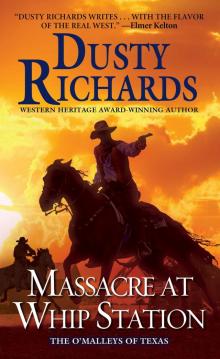 Massacre at Whip Station
Massacre at Whip Station Blue Roan Colt
Blue Roan Colt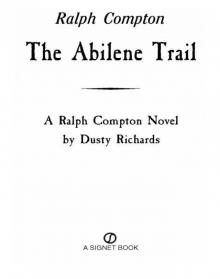 The Abilene Trail
The Abilene Trail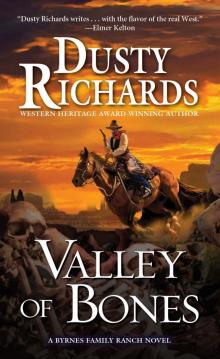 Valley of Bones
Valley of Bones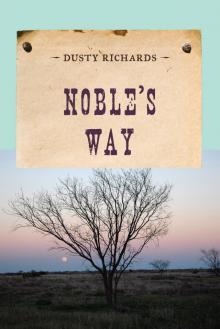 Noble's Way
Noble's Way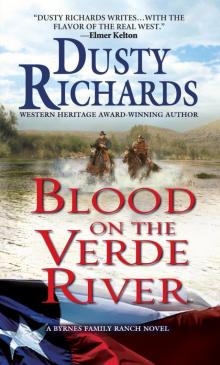 Blood on the Verde River
Blood on the Verde River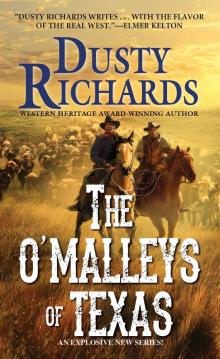 The O'Malleys of Texas
The O'Malleys of Texas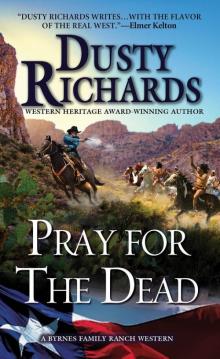 Pray for the Dead
Pray for the Dead Arizona Territory
Arizona Territory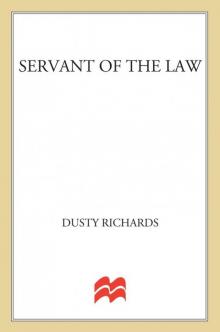 Servant of the Law
Servant of the Law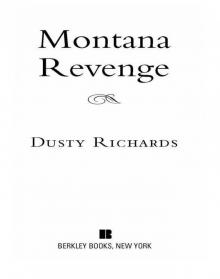 Montana Revenge
Montana Revenge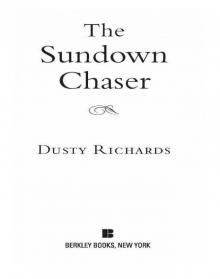 The Sundown Chaser
The Sundown Chaser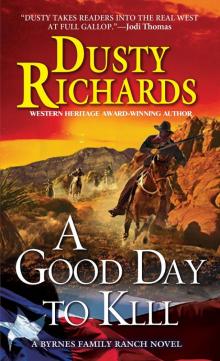 A Good Day To Kill
A Good Day To Kill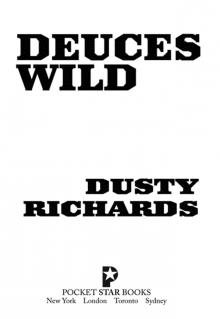 Deuces Wild
Deuces Wild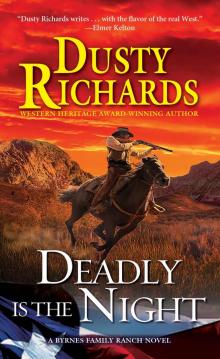 Deadly Is the Night
Deadly Is the Night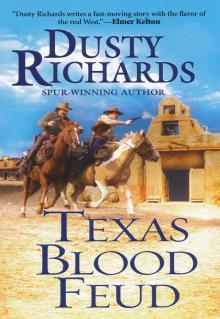 Texas Blood Feud
Texas Blood Feud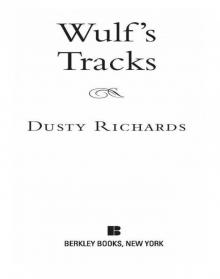 Wulf's Tracks
Wulf's Tracks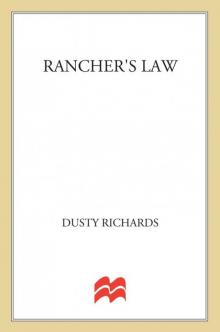 Rancher's Law
Rancher's Law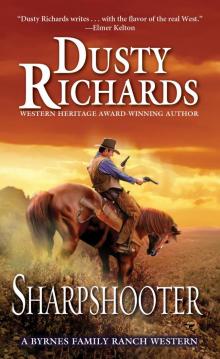 Sharpshooter
Sharpshooter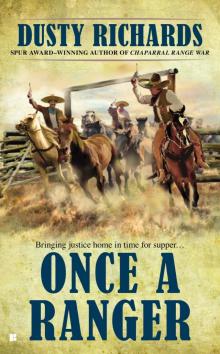 Once a Ranger
Once a Ranger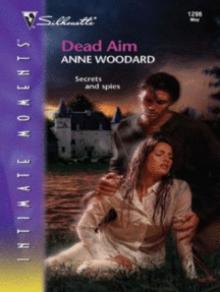 Dead Aim
Dead Aim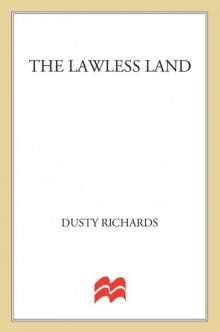 Lawless Land
Lawless Land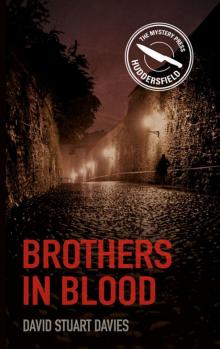 Brothers in Blood
Brothers in Blood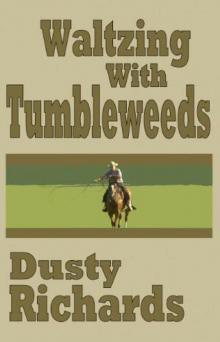 Waltzing With Tumbleweeds
Waltzing With Tumbleweeds